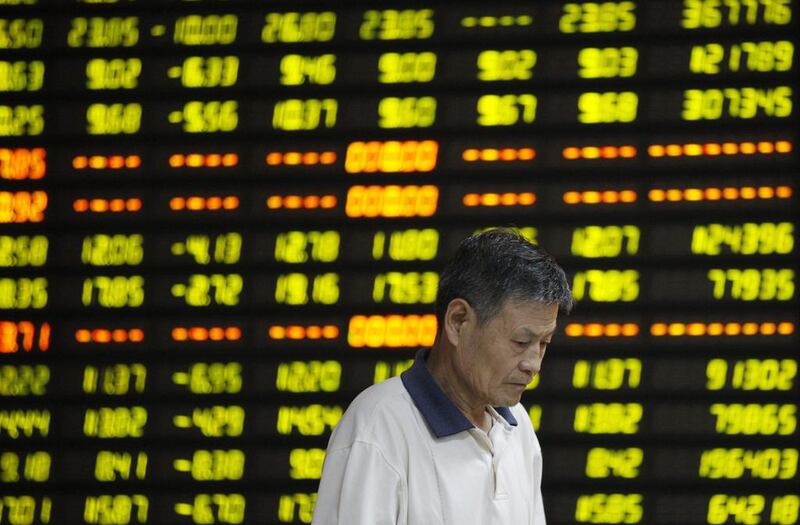Stocks in the UAE held their ground even as the sell-off in emerging market assets intensified yesterday, with China’s main stock index sinking 8.5 per cent.
But UAE investors shrugged off the foreign turmoil and a drop in the price of oil, instead pinning their hopes on buoyant corporate earnings. Investors are also betting that the government’s move last week to reduce fuel subsidies will ease pressure on public finances and that an easing of Iran sanctions will be a boon to Dubai’s trade-based economy.
The Dubai Financial Market General Index closed down less than 0.1 per cent, while the benchmark Abu Dhabi index increased 0.1 per cent. Both indexes have outperformed the benchmark emerging market index this year. The more closely watched DFMGI index has gained 9.9 per cent this year, compared to a 4.8 per cent drop in the MSCI Emerging Markets Index.
Emirates NBD, the second-biggest publicly traded bank in the UAE, rose 1.4 per cent while National Bank of Abu Dhabi, the biggest bank in the emirate by assets, gained 0.9 per cent. Emirates NBD reported a 26 per cent rise in profit last week, with most other lenders that have released earnings so far posting double-digit growth.
“We’re in earnings season and some of the earnings in the UAE like bank earnings have been all right, so that’s helping,” said Simon Kitchen, a strategist at the Egyptian investment bank EFG-Hermes Holding. “For the UAE, the macro outlook isn’t that bad, a decent non-oil economy that stands to benefit from Iran opening up and if they continue to make reforms. It’s positive that they are moving away from the subsidy model. They still have a lot of subsidies, but they are moving away from it.”
Chinese equities led the plunge in developing market indexes yesterday amid concerns that government measures to stem the bear market that began in June will fail. The Shanghai Composite Index dropped 8.5 per cent, its steepest drop in eight years. The MSCI Emerging Markets Index, in which China has a weighting of about 20 per cent, fell 1.6 per cent.
Chinese stocks continued to slide even though authorities in the world’s second-largest economy sought to stem the sell-off. They introduced measures this month such as getting state-run firms to buy equities, allowing companies to halt trading in their shares, and preventing investors with equity stakes of more than 5 per cent to sell in the next six months.
Reuters reported yesterday that the China Securities Financial Corporation has returned ahead of schedule some of the funds it borrowed from commercial banks to stabilise the stock market. That would help explain why the markets sank yesterday, highlighting investor concern that Beijing’s commitment to supporting the market may be flagging.
The sell-off in the past month has wiped more than US$3.2 trillion off Chinese stocks, and follows a rally that many observers said was speculative and not based on reasonable expectations of economic growth.
Nevertheless, the Shanghai Composite Index is still up 15 per cent so far this year. The index had more than doubled in the 12 months leading up to the crash, partly bolstered by investors borrowing money to buy stocks.
Emerging market equities have been among the most unloved assets in recent years as weakening demand for commodities globally has taken a toll on many of these nations that rely on exports such as oil, gas, wheat and sugar to bolster economic growth.
But because overall global growth has been lacklustre, price inflation has slowed and commodity prices have been declining or treading water. Oil, which fires up growth in the crude-rich Arabian Gulf, has been declining in part because of weakening demand from China as factories reduce output amid softening demand for the country's exports.
Crude has shed about 50 per cent of its value in the past 12 months. Production by countries including the United States has risen, while demand has waned amid economic uncertainty.
The UAE’s federal government relies on oil revenues to fund more than 60 per cent of its budget. Despite the price drop, the UAE economy is estimated to have grown more than 4 per cent last year.
As a result of the oil slump, many economists – including those at HSBC, Standard Chartered and the IMF – have lowered their growth forecasts for Arabian Gulf countries this year.
The IMF cut its estimate of the UAE’s GDP growth to 3.2 per cent. Still, that puts the UAE towards the top end of the agency’s overall 2015 global growth estimate of 3.3 per cent.
mkassem@thenational.ae
Follow The National's Business section on Twitter






